|
Butter and Rum Crepes, Fancy and Plain
(Crepes Suzette-like) - Makes about 10 crepes
Crepes are a high/low sweet. They can be the finish of a luxe meal or a snack you pick up at an outdoor stand and eat on the run. Perhaps the most famous crepe dish is crepes Suzette, a dish that’s attributed to a mistake. In 1895, Henri Charpentier, who would later become a great chef, was a young waiter in Monte Carlo charged with serving crepes to the Prince of Wales, who would later become the King of England. In that age of tableside service, Charpentier had a pan of liqueurs at the ready to make a sauce for the guest, when the alcohol went up in flames. The waiter may have been young, but he was resourceful – he quickly slid the crepes into the pan of boiling liqueur, swirled them around, and, with extraordinary élan, presented them as Crepes Princesse, honoring Suzanne, Edward’s daughter, who was at the table. Later the name was changed to Suzette, ostensibly at the prince’s request.
Not surprisingly, the paper-thin pancakes get simpler treatment on Paris streets, where crepe stands are abundant. Often you’ll see a stand about the size of a telephone booth attached to a café or on a street corner, and when you go to markets, you’ll find mobile crepe and waffle trucks, usually with lines of eager snackers in front of them. The most popular toppings for snack crepes are sugar and butter (put a pat of butter on a hot crepe, spread it as it melts, and sprinkle with sugar), jam or marmalade, Grand Marnier (a splash creates a crepes Suzette moment), Nutella, or, for a splurge, Nutella topped with thin slices of banana. The crepes are made on large round griddles: the batter is smoothed over them with a long wooden spatula, and then, when both sides of the crepe are cooked and the topping has been added, the spatula is used to fold the crepe into quarters. You end up with a four-layer triangle of crepe that, wrapped in a piece of waxy paper, is not just delicious, but the best hand warmer on a winter’s day.
Usually street-corner crepes are made with the simplest ingredients, but when you’re making crepes at home, there’s no reason not to make them with a little extra butter and a spoonful of dark rum, so that even if all you do is sprinkle them with sugar, you’ve got crepes with a lot of flavor.
If you’d like to do more than sugar the crepes, you can fold them into triangles, fill them with lemon curd (delicious but optional), and drizzle over a sauce with all the flavors of the original Suzette. The sauce comes from Pierre Hermé, and while it’s simpler than the classic, it’s no less seductive.
Be Prepared: Crepe batter is very quick to make, but it absolutely must rest in the refrigerator before you use it – it needs the rest and chill to become perfectly blended and to thicken. Two hours is the minimum; 12 hours or more is ideal.
FOR THE CREPES:
2 tablespoons sugar, plus more for sprinkling
Finely grated zest of 1/2 lemon
Finely grated zest of 1/4 orange
Pinch of salt
2 large eggs
3/4 cup whole milk, plus a little more if needed
1 tablespoon dark rum or 1-1/2 teaspoons pure vanilla
2 teaspoons Grand Marnier (optional)
3 tablespoons unsalted butter, melted
1/2 cup all-purpose flour
Canola oil or other flavorless oil, for the pan
FOR THE SAUCE:
1/3 cup honey
1/3 cup fresh orange juice
1/4 cup fresh lemon juice
7 tablespoons unsalted butter, at cool room temperature
FOR THE OPTIONAL FILLING:
Lemon Curd (see below)
|
|
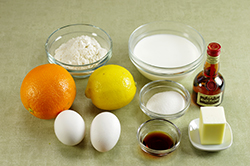
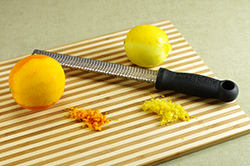
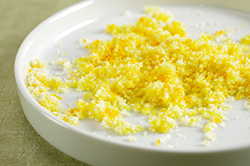
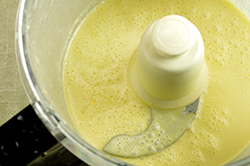
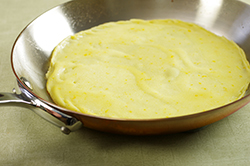
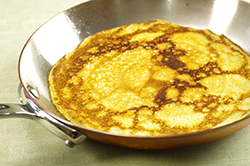
|
To Make the Crepes: If you’d like, put the sugar and zests into a bowl and rub the ingredients together with your fingertips until the sugar is moist and very fragrant. (This is a great technique for getting all of the flavor from the zests’ volatile oils into the sugar.) Rubbed or not, put the sugar and zests in a blender or food processor. Add the salt, eggs, milk, rum or vanilla, and Grand Marnier, if you’re using it, and whir to blend. Pour in the butter and whir until the mixture is well blended. Add the flour and pulse the machine to incorporate it. Make certain the flour is blended, but don’t mix the batter too much. Pour the batter into a pitcher or a large measuring cup with a spout, cover, and refrigerate for at least 2 hours. (The batter can be refrigerated for up to 1 day.)
When you’re ready to make the crepes, sprinkle a dinner plate with sugar, and keep the sugar bowl close by. Check the batter: it should be just a bit thicker than heavy cream. If it seems a little too thick – it should pour easily – thin it with milk, stirring it in a drop at a time.
To make the crepes, you’ll need a seasoned or nonstick 7-1/2-inch-diameter crepe pan or a similar-sized skillet. Rub the pan with a lightly oiled crumpled paper towel and put the pan over medium heat. When it’s hot, lift it from the heat and pour in 2 to 3 tablespoons of batter; as soon as the batter is in the pan, swirl the pan to spread the batter in a thin, even layer. If you’re new at this, the easiest thing is to pour in more batter then you need, quickly swirl the pan, and then pour the excess batter back into the pitcher. Return the pan to the heat – use a small spatula to cut off the tail that formed if you poured back the batter – and cook until the top of the crepe is set. Run the spatula – an offset icing spatula is great for crepe making – around the edges of the crepe and take a look at the underside: if it’s browned, flip it over, a job best done with your fingers. Cook until the underside is speckled with brown spots (t will never be as brown or a s pretty as the first side). Transfer the crepe to the sugared plate, sprinkle it lightly with sugar, and continue with the rest of the batter. The crepes can be used now or held for later (see Storing).
To Make the Sauce: If you have an immersion blender, this is a good job for it; if not, use a whisk. Melt the honey in a microwave oven or in a saucepan over low heat. Cool the honey for 5 minutes, then add the orange and lemon juices. Blend or whisk in the butter, adding it a tablespoon at a time. You’ll have a smooth, slightly thickened sauce. (The sauce can be refrigerated overnight; reheat before serving.)
If you want to fill the crepes, spoon some lemon curd onto the upper-right-hand quarter of each crepe, fold the crepe up from the bottom, so you cover the filling, and finish by folding the left half of the crepe over the right, forming a triangle. If you’re not filling the crepes, fold them in quarters. Arrange the crepes on plates, drizzle the sauce over them, and serve immediately.
Serving: Although you can certainly eat crepes out of hand and imagine yourself on the streets of Paris, I serve these as a plated dessert because I’m crazy about the impossible-to-eat-on-the-run sauce. Whether filled with lemon curd or just sprinkled with sugar, the crepes should be folded into triangles and drizzled with the sauce
Storing: You can make the crepe batter and sauce a day ahead and keep them covered in the refrigerator; reheat the sauce gently before using. You can even make the crepes ahead. Let cool, then wrap them airtight and keep them in the refrigerator for up to 1 day or in the freezer for up to 2 months; if you want to freeze the crepes, stack them, putting a piece of wax paper between each crepe, and then wrap them airtight. Thaw, still wrapped, in the refrigerator. To reheat the crepes, wrap them in aluminum foil – it’s best to make 2 packets – and put them in a 350-degree-F oven for about 5 minutes. |
|
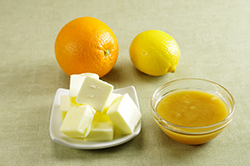
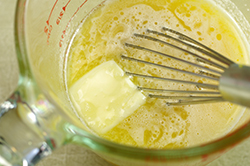
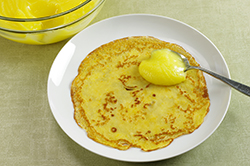
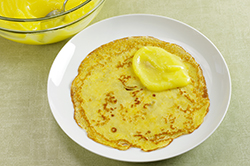
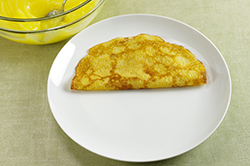
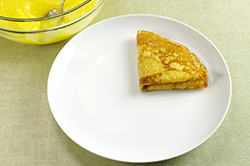
|
Lemon Curd
Makes a generous 2 cups
This recipe was given to me during a cooking class I took with Jacques Pourcel, who, with his brother Laurent, has a Michelin-starred restaurant in Provence and nineteen other restaurants around the world. At least I thought this was the recipe the chef handed out, but after I made it and was delighted with the results, I realized I’d made a mistake. I was supposed to use just yolks, and instead I made the curd with the whole eggs. Made my way, the curd is just a tiny bit lighter and just a little less fussy to cook, since whites can take more heat than yolks.
1-1/4 cups sugar
4 large eggs
1 tablespoon light corn syrup
About 3/4 cup fresh lemon juice (from 4-5 lemons)
8 tablespoons (1 stick) unsalted butter, cut into chunks
In a medium heavy-bottomed saucepan, whisk the sugar and eggs together until blended. Whisk in the corn syrup and lemon juice and then drop in the chunks of butter.
Put the saucepan over medium heat and start whisking, taking care to work the whisk into the edges of the pan. If your whisk is too big to clean the edges of the pan, switch to a wooden spoon or a silicone spatula. Keep heating and whisking the mixture without stopping. After about 6 to 8 minutes, you’ll notice the curd starting to thicken – it won’t be very thick, but the change is easily perceptible. When the curd is thickened and, more important, you see a bubble or two burble to the surface and then pop immediately, remove the pan from the heat.
Scrape the curd into a heatproof bowl or a canning jar or two. Press a piece of plastic wrap against the surface to create an airtight seal, and let the curd cool to room temperature. Chill before serving.
Serving: The curd can be used straight from the jar as a spread or a tart filling.
Storing: Packed into an airtight container – I always keep a piece of plastic wrap pressed against the surface – the curd can be refrigerated for at least 3 weeks. |
|
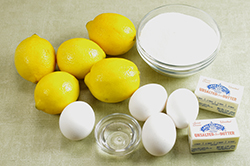
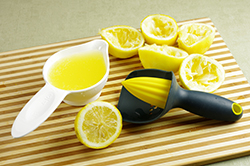
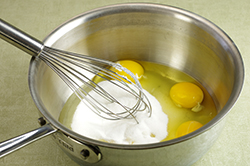
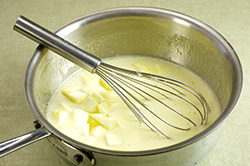
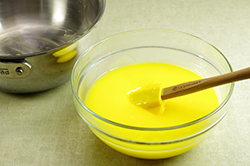
|
|
|
Kitchen Collage | 430 E. Locust St | Des Moines | IA | 50309 | (515) 270-8202 | Copyright 2013 - Acorn Advisors |
|
|

